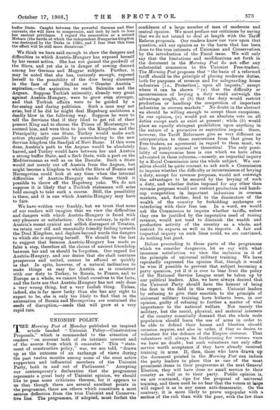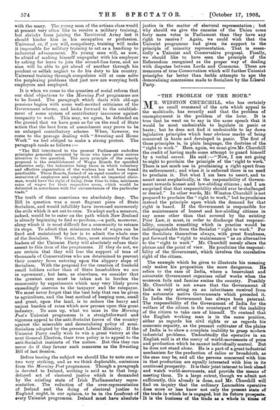UNIONIST POLICY.
THE Morning Post of Monday published an inspired article headed "Unionist Policy—Constructive Proposals," which is commended to the attention of readers " on account both of its intrinsic interest and of the source from which it emanates." This "state- ment -of constructive policy," was, we are told, "drawn up as- the outcome of an exchange of views during the past twelve months among. some of the most active supporters and influential members of the Unionist Party, both in and out of Parliament." Accepting our contemporary's declaration that the programme represents a great body of Unionist opinion, we should like to pass some criticisms thereon, for it appears to us that,- though there . are several excellent points in the programme, there are others which constitute a most serious deflection from time true Unionist and Conserva- tive line: The programme, if adopted, must forfeit the confidence of a large number of men of moderate and central opinion. We must preface our criticisms by saving that we do not intend to deal at length with the Tariff Reform proposals. Our readers know our view upon that question, and our opinion as to the harm that has been . done to the true interests of Unionism and Conservatism by the introduction of the Fiscal issue. We will only say that the limitations and modifications set forth in the document in the Morning Post do not offer any • substantial concession to the Unionist Free-traders. The Morning Post proposes that "the basis of a reformed 'tariff should be the principle of placing moderate duties, • both for purposes of reveuue and for safeguarding home industries [i.e., Protection], upon all imports," except where it can be shown "(a) that the difficulty or inconvenience of levying a duty would outweigh the advantage sought, or (b) that the duty would restrict • production or handicap the competition of important industries in oversea markets." No doubt in the abstract we should be willing enough ' to accept these exceptions. In our opinion, (a) would put an absolute veto on all ' duties except such as exist at present; while (b) would place an equally stringent prohibition upon anything in the nature of a protective or restrictive impost. Since, however, the Tariff Reformers give so very different an interpretation to these restrictions from that given by Free-traders, an agreement in regard to them must, we fear, be purely nominal or theoretical. The only possi- bility of compromise here is one which we have often advocated in these columns,—namely, an impartial inquiry by a Royal Commission into the whole subject. We our- selves should be quite content to ask such a Commission to inquire whether the difficulty or inconvenience of levying a duty, except for revenue purposes, would not outweigh the advantages to be secured by the levying of such a duty, and whether duties imposed for any other than revenue purposes would not restrict production and handi- cap competition in important industries in oversea markets, and, further, lead to the diminution of the wealth of the country by forbidding exchanges or interfering with their free use. In a word, we would ask the Commission to inquire whether tariffs, unless they can be justified by the imperative need of raising revenue, would not tend to diminish the wealth and productive activity of the country as a whole, and restrict its exports as well as its imports. A fair and impartial inquiry on such lines could, we are convinced, do nothing but good.
Before proceeding to those parts of the programme which we consider dangerous, let us say with what: immense satisfaction we view the inclusion in it of the principle of universal military training. We have repeatedly expressed the opinion that, though it would be wise if possible to prevent that subject becoming a party question, yet if it is ever to bear fruit the policy of the National Service League must be taken up by our political leaders. Also, we have always desired that- the Unionist Party should have the honour of being the first in the field in this respect. Unionist leaders by refusing to give their sanction to the principle of universal military training have hitherto been, in our opinion, guilty of refusing to further a matter of vital importance to the national welfare. Not merely the military, but the moral, physical, and material interests of the country essentially demand that the whole male population should learn the use of arms in order to be able to defend their homes and liberties should occasion require, and also in order, if they so desire, to volunteer for the defence of the Empire overseas. That volunteers will always be forthcoming for oversea. wars we have no doubt; but such volunteers can only offer service worth acceptance if they have already received training in arms. If, then, those who have drawn up the document printed in the Morning Post can induce the party leaders to place this as one of the most prominent items in their programme at the next General Election, they will have done no small service to their country as well as to their party. Public opinion is, we are convinced, ripe for the proposal of universal training, and there need be no fear that the voters at large will regard it as in any sense anti-democratic. On the contrary, it is more likely to prove unpopular with a section of the rich than with the poor, with the few than with the many. The young man of the artisan class would at present very often like to receive a, military training, but shrinks from joining the Territorial Army lest it should hinder him in his occupation or profession. Universal, or, if you will, compulsory, training will make it impossible for military training to act as a handicap to industrial advancement. No young man will, as now, be afraid of making himself unpopular with his employer by asking for leave to join the second-line force, and no man will be able to get ahead of another through his prudent or selfish neglect to do his duty to his country. Universal training through compulsion will at once solve the perplexing problems that just now are worrying both employers and employed.
It is when we come to the question of social reform that our chief objections to the Morning Post programme are to be found. The paragraph which deals with old-age pensions begins with some well-merited, criticisms of the Government scheme, and looks forward to the establish- ment of some system of contributory insurance against incapacity to work. This may, we agree, be defended on the ground that we have gone so far on the road of State action that the best form of amendment may prove to be an enlarged contributory scheme. When, however, we come to the passage dealing with "Sweating and Home Work" we feel obliged to make a strong protest. The paragraph reads as follows :— "The Bill introduced in the present Parliament embodies principles generally accepted by those who have given serious attention to the question. The main principle of the remedy proposed is the establishment of Wages Boards for specified industries only, the industries being those in which voluntary and effective organisation of the workers has not been found practicable. These Boards, formed of an equal number of repre- sentatives of employers and employed, with an impartial chair- man, would have the right of fixing, from time to time, minimum rates of wages for their respective areas, which would be delimited in accordance with the circumstances of the particular trade."
The truth of these assertions we absolutely deny. The Bill in question was a most flagrant piece of State Socialism, and would infallibly have increased enormously the evils which it set out to cure. To adopt such a measure, indeed, would be to enter on the path which New Zealand is already beginning to find so perilous,—a path, moreover, along which it is most difficult for a community to retrace its steps. To admit that minimum rates of wages can be fixed and maintained by law is to admit the whole case of the Socialists. We trust, then, most sincerely that the leaders of the Unionist Party will absolutely refuse their assent to this item of the programme. If they do not, we are certain that they will lose the support of tens of thousands of Conservatives who are determined to prevent their country from entering upon the slippery slope of Socialism. With the proposal for the creation of freehold small holders rather than of State leaseholders we are in agreement ; but here, as elsewhere, we consider that the greatest care must be taken not to burden the community by experiments which may very likely prove exceedingly onerous to the taxpayer and the ratepayer. We must never forget that the best help that can be given to agriculture, and the beat method of keeping men, small and great, upon the land, is to reduce the heavy and unjust burden of rates which now presses upon this great industry. To sum up, what we miss in the Morning Post's 'Unionist programme is a straightforward and vigorous appeal to the anti-Socialist forces of the country against the miserable and demoralising policy of semi- Socialism adopted by the present Liberal Ministry. If the Unionist Party really wish to win a great victory at the next General Election, their true policy is to appeal to the anti-Socialist instincts of the nation. But this they can never do if they favour such measures as the Sweating Bill of last Session.
Before leaving the subject we should like to note one or two very striking, and as we think deplorable, omissions from the Morning Post programme. Though a paragraph is devoted to Ireland, nothing is said as to that long- delayed act of electoral justice which is demanded by the existing state of ' Irish Parliamentary repre- sentation. The reduction of the over-representation of Ireland and the doing of electoral justice to England ought, in our opinion, to be in the forefront of every Unionist programme. Ireland must have' absolute justice in the matter of electoral representation ; but why should we give the enemies of the Union some forty more votes in Parliament than they have any right to receive ? Again, we could wish that the Unionist programme bad given its support to the principle of minority representation. That is essen,. tially a Unionist and Conservative proposal. Finally, we should like to have seen the principle of the Referendum recognised as the proper way of dealing with disputes between Lords and Commons. These are measures of true Conservatism which will further Unionist principles far better than feeble attempts to ape the demoralising concessions made to Socialism by the Liberal Party.















































 Previous page
Previous page